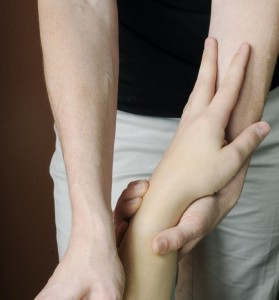8 Reasons Why We Need Touch Now More Than Ever
 Even in a digital age, we crave real human contact. Here’s why.
Even in a digital age, we crave real human contact. Here’s why.
source: www.khca.org
Physical contact distinguishes humans from other animals. From a warm handshake or sympathetic hug to a congratulatory pat on the back, we have developed complex languages, cultures, and emotional expression through physical contact. But in a tech-saturated world, non-sexual human touch is in danger of becoming rare, if not obsolete. Despite the benefits of digital advancement, it is vital to preserve human touch in order for us truly to thrive.
Humans become nearly unrecognizable in the absence of touch. Two hundred years ago, French scientists spotted a creature resembling a human running through the forests. Once captured, they determined he was 11 years old and had run wild in the forests for much of his childhood. Originally the child, “Victor,” was determined to be an idiot; French physicians and psychiatrists eventually concluded he had been deprived of human physical touch, which had retarded his social and developmental capacities.
Scientific research now correlates physical touch with the following important areas:
1. Decreased violence. Less touch as a child leads to greater violence. American developmental psychologist James W. Prescott proposed that the origins of violence in society were related to the lack of mother-child bonding. Child developmental research illustrates that the absence of physical bonding and healthy attachmentbetween an adult and child may result in lifelong emotional disturbances.
2. Greater trust between individuals. Touch helps to bond people together. Daniel Keltner, the founding director of the Greater Good Science Center and professor of psychology at University of California, Berkeley, cites the work of neuroscientist Edmund Ross, who found that physical touch activates the brain’s orbitofrontal cortex, linked to feelings of reward and compassion. According to Keltner, “studies show that a simple touch can trigger release of oxytocin, aka ‘thelove hormone.'” Our skin contains receptors that directly elicit emotional responses, through stimulation of erogenous zones or nerve endings that respond to pain, according to researchers Auvray, Myin, and Spence.
3. Economic gain. Keltner links economic benefits to physical touch, probably because “touch signals safety and trust; it soothes. Basic warm touch calms cardiovascular stress. It activates the body’s vagus nerve, which is intimately involved with our compassionate response.” NBA teams whose players touch each other more, for example, win more games.
4. Decreased disease and stronger immune system. Physical touch may also decrease disease. According to research conducted at the University of North Carolina, women who receive more hugs from their partners have lower heart rates and blood pressure: “Hugs strengthen the immune system…The gentle pressure on the sternum and the emotional charge this creates activates the Solar Plexus Chakra. This stimulates the thymus gland, which regulates and balances the body’s production of white blood cells, which keeps you healthy and disease free.” Research at University of California’s School of Public Health found that getting eye contact and a pat on the back from the doctor may boost the survival rate of patients with complex diseases.
5. Stronger team dynamics. Paul Zak, author of The Moral Molecule, argues, “We touch to initiate and sustain cooperation.” He conducted a “neuroeconomics” studyfrom which he argues that hugs or handshakes are likely to cause the release of the neurochemical oxytocin, which increases the chances that a person will treat you “like family,” even it you just met.
6. More non-sexual emotional intimacy. Interpersonal touch has a powerful impact on our emotions. Studies have shown that a gentle brush of a woman’s arm can boost a man’s chances in love; another study showed that twothirds of women agreed to dance with a man who touched her on the arm a second or two before making the request.
7. Greater learning engagement. When teachers touch students platonically, it encourages their learning. French psychologist Nicolas Guéguen reports(link is external) that when teachers pat students in a friendly way, those students are three times as likely to speak up in class. Another recent study has found that when librarians pat the hand of a student checking out a book, that student says he or she likes the library more and is more likely to return.
8. Overall wellbeing. Adults require human touch to thrive. Keltner says, “In recent years, a wave of studies has documented some incredible emotional and physical health benefits that come from touch. This research is suggesting that touch is truly fundamental to human communication, bonding, and health.” As Sharon K. Farber says, “Being touched and touching someone else are fundamental modes of human interaction, and increasingly, many people are seeking out their own professional touchers and body arts teachers—chiropractors, physical therapists, Gestalt therapists, Rolfers, the Alexander-technique and Feldenkrais people, massage therapists, martial arts and T’ai Chi Ch’uan instructors. And some even wait in physicians’ offices for a physical examination for ailments with no organic cause—they wait to be touched.”
In conclusion: Physical touch is the foundational element of human development and culture. The growing preoccupation with digital media versus personal physical contact, combined with the social and legal restrictions over physical contact in our schools and workplaces, may unintentionally affect these factors negatively. To foster a safe social environment in a climate of mediated communication, we should intentionally hold on to physical touch.
References
Auvray, M., Myin, E., & Spence, C. (2010). The sensory-discriminative and affective-motivational aspects of pain. Neuroscience and Biobehavioral Reviews, 34, 214-223.
Paladino, M.P., Mazzurega, M., Pavani, F., & Schubert, T. (2010). Synchronous multisensory stimulation blurs self-other boundaries. Psychological Science, 21, 1202-1207
Wilhelm, F. H., Kochar, A. S., Roth, W. T., & Gross, J. J. (2001). Social anxiety and response to touch: Incongruence between self-evaluative and physiological reactions. Biological Psychology, 58, 181-202
